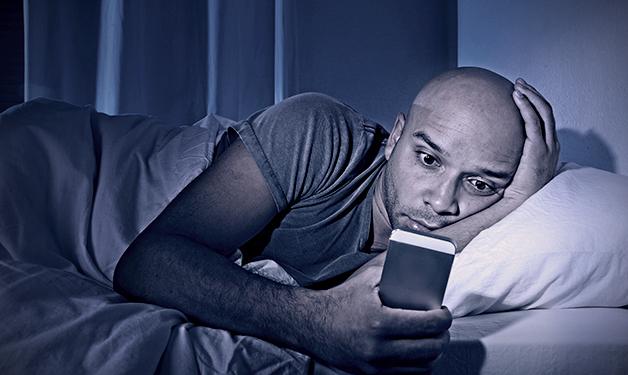
Daylight savings happens this weekend and while losing one hour of sleep can affect feelings of restfulness and alertness the next day (and week), screen time before nodding off may actually be a bigger concern.
Q: How does light from my computer or phone before bed affect my sleep quality?
A: Your internal biological clock, or circadian rhythm, helps to regulate your sleep time and consolidate your nightly sleep. This rhythm is very sensitive to light exposure. When you are exposed to artificial light late at night, it fools your body into thinking it is light outside when it is not. Ultimately, this sends your body the message that it’s time to be awake and doesn’t support the opposite message that it’s time to wind down and go to sleep.
Q: What kind of time buffer should I build between being on my phone or computer and going to bed?
A: It depends on the sensitivity of the individual, to some extent. For people who have insomnia, such as trouble getting to sleep or staying asleep, or for individuals sleeping too late and finding it difficult to get up in the morning, I usually tell them not to expose themselves to light for couple of hours before bedtime, and in particular the blue light that comes from our phones and computers.
And while some people are able to go to bed just fine after being on their phone or computer, most people when I advise them to try avoiding it feel like they sleep better.
The other problem with such screens is that you tend to focus on them a lot and you don’t look away. At least with TV, you tend to look away once in a while. And if you’re reading a book, you're getting indirect light, so it’s not as bad.
Q: Why does daylight savings seem to knock my universe out of order and how can I beat it this year?
A: The issue with daylight savings is that you’re losing one hour of sleep, so it’s the sleep deprivation that a person needs to get used to. What you want to do is try to sleep earlier. If you’re one of these individuals who’s sensitive to sleep loss, or if you’re waking up early already, try to advance your sleep time a little bit a few days before daylight savings time. In terms of things that will tend to advance your sleep phase, exposing yourself to a lot of light in the morning – which people should do anyhow – and then in the evenings minimizing exposure to light will help.
In the end, the one hour of sleep loss likely doesn’t have a huge effect in terms of shifting your rhythm back and forth. The more important issue is that many people suffer from chronic sleep deprivation and this additional sleep loss may have more substantial effects in them.
Maybe take this year’s daylight savings time as a good opportunity to try and get to bed earlier and minimize evening exposure to light by shutting down the phone or computer an hour or two before bed.
Q: How many hours of sleep should I be getting?
A: While there’s no real set number for this, it’s thought that around 8.5 hours is ideal if you’re trying to sleep enough to maximize your cognitive output and maximize vigilance (or feeling awake). In terms of health, it’s been shown that individuals who report that they sleep less than seven hours per night are at risk of negative health consequences, such as increased risk of heart attack, diabetes, and weight gain. However, in this case, we’re not sure which is the chicken or the egg.
Q: Does sleep apnea (snoring) take a toll on the body?
A: Sleep apnea tends to be a range of disease. There are definitely a variety of adverse health consequences associated sleep apnea; the main one is daytime tiredness because of the disruption and fragmentation of their sleep. They also have an increased risk of motor vehicle crashes and occupational injuries, likely from the reduced vigilance. The good thing is, sleep apnea treatment seems to be very effective for these negative side effects.
Over the past 10 to 15 years, our understanding has grown that patients with severe sleep apnea are at increased risk of a variety of cardiovascular consequences as well. Untreated sleep apnea increases an individual’s risk of heart attack or stroke by a factor of three, and that’s even if you control for a variety of confounders like obesity.



